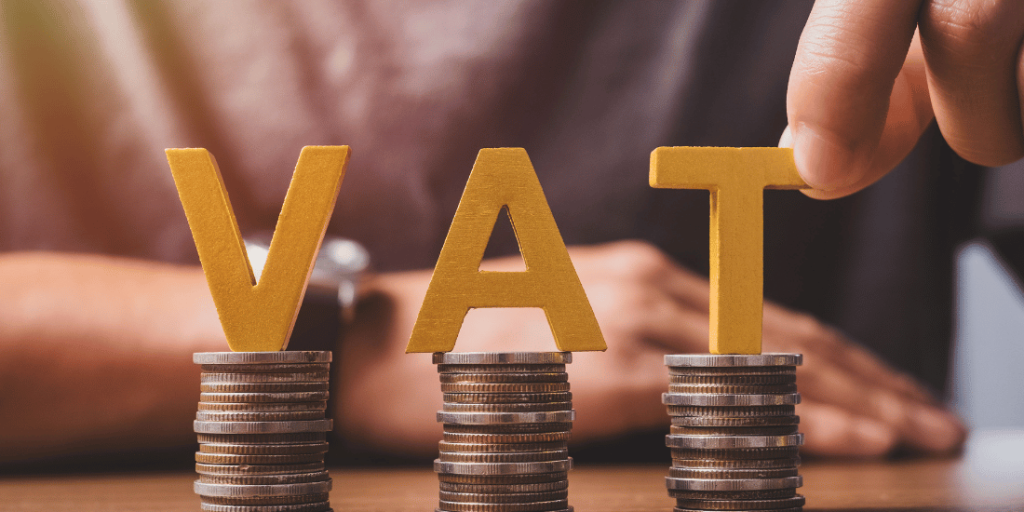In January 2023, HMRC changed the way that late or incomplete VAT payments are dealt with.
The old surcharge system is gone, and HMRC have replaced it with a new penalty system that is likely to cause problems for firms that are subjected to it.
Let’s take a look at what the new 23/24 VAT penalty system is, what to do if you’re struggling to meet your VAT obligations, and explore the ways that businesses can protect themselves from penalties in the future.

The new VAT penalty system
The new VAT penalty system is applied to all accounting periods from the 1st Jan 2023.
It’s a fairly unrelenting system imposed by HMRC and penalty charges can stack up fairly quickly once any VAT payment is overdue.
To break it down, when your VAT is just 16 days overdue you will receive your first penalty.
Then, if you’ve still not paid by the time your payment is 31 days overdue, your first penalty will be increased and you will receive a separate 2nd penalty. We should also point out that the penalty imposed will be a percentage of the total VAT that you owe.
HMRC aren’t known for letting things go..
HMRC are not known to be particularly forgiving when it comes to dealing with overdue tax payments.
While this causes many to adopt a negative attitude towards HMRC, we do have to also appreciate the importance of their role in the economy. They are responsible for ensuring that all tax is collected, which is an essential part of running the country.
If HMRC don’t double down on issues like overdue tax payments then as a citizens of the UK we’re all missing out. If businesses were allowed to get away with not meeting their tax liabilities, then government income wouldn’t be as high as it should be, and this would create real problems when it comes to the running of the country and the allocation of funds.
So we should all expect HMRC to relentlessly chase overdue tax payments.
Why is it so important to avoid late penalties and fines over VAT?

We all know that it’ll be better for us if we pay our VAT on time. It saves money, reduces stress levels, etc. But despite this, thousands of businesses are late on their payments every year.
While missing or putting off one VAT payment might not seem like a big deal, you’d be surprised how quickly penalties, surcharges and interest can all start accruing, especially with the new 23/24 VAT penalty system now in place.
Things can spiral out of control pretty quickly, and HMRC are only likely to pour fuel on the fire in this respect.
HMRC views defaulting on any tax payments, including VAT, as a strong signal that your business is not healthy and is on its way to insolvency. Given HMRC’s firm approach to taxation, it’s not uncommon for them to petition for your firm to be placed into compulsory liquidation.
HMRC do this as a last resort to recover the outstanding debt, as liquidation allows HMRC to sell off the company’s assets to repay creditors, including HMRC itself.
If you find yourself struggling to meet VAT, what are your options?
Of course, preventing such a situation from occurring in the first place is the best course of action (which we’ll discuss later), but that doesn’t help you if it’s already too late.
So, what are your options?
1 – Enter into a ‘Time to Pay’ arrangement
If you’ve fallen behind your VAT liabilities and are now facing rising penalties and interest, you might be able to enter into a ‘time to pay’ arrangement.
This is basically where you are given the opportunity to spread your business tax payments over a longer period of time. You have to agree this with HMRC, and its not guaranteed that you will be offered any such arrangement.
The best advice here is to be proactive. You need to be the one to initiate contact with HMRC to discuss this… Don’t wait for HMRC to contact you.
The next thing to keep in mind is that HMRC don’t appear to be keen on offering out ‘time to pay’ arrangements. This is likely because they need to be confident that businesses are not merely avoiding their tax responsibilities, and they do have a fairly high bar in this regard.
Before you contact them, you should look to put a strong case together that shows both why you need to enter the arrangement and evidence that you will be able to meet the payments moving forward.
Keep in mind that if you are granted a ‘time to pay’ arrangement, it is something that is usually only offered once. In addition to this, you must ensure that you meet the agreed payments like clockwork. Failure to meet ‘time to pay’ liabilities will make your problems much worse.
2 – Take a proactive approach with commercial finance

As we’ve discussed in this article, problems can occur pretty quickly once your business misses a VAT payment, and the longer you leave it, the more costly it becomes.
So, the question is, how do businesses end up in this situation, and what can be done about it?
Well, given VAT is 20% of total revenue, a business’s VAT tax bill often represents a substantial cost. The approach that many firms try to take is to prepare for this well in advance and keep a VAT pot set aside.
Unfortunately, in business things are rarely that simple… Even if a business is forward thinking enough to plan in this way, they might need to dip into those funds, for example to supplement their growth efforts or cover unexpected costs.
This can create the situation where an impending VAT bill can put a real strain on a business’s cash flow position, which of course comes with a number of other issues.
This is a difficult position to be in. The business has to decide whether to pay their VAT on time, causing their cash flow to fall apart, or try to delay the payment. It’s easy to see how something as common as making VAT payments causes real headaches for so many businesses.
But, does it have to be like this?
A simple solution that negates all of these problems ahead of time is to source business funding for your VAT liability through a commercial finance brokerage such as Acorn.
With a bespoke business loan for your VAT bill, you can both meet your tax obligations whilst maintaining a healthy cash flow position.
At Acorn, we’re experts in business loans such as this. Our fresh approach to finance means that you’ll get personal service and a bespoke finance solution to suit your needs. We’ve made the process for applying as quick and simple as possible, and once submitted you can expect a decision on your loan within 48-72 hours.
We can also source up to £150k of unsecured funding with no Personal Guarantees needed by the directors as a solution to the VAT problem.
To learn more, visit our business loans page, or book a call with our team.
Conclusion
The new 2023/2024 penalty system for late VAT payments is just the latest way that HMRC is dealing with overdue tax payments. As we’ve discussed in this article, things can quickly spiral out of control when VAT payments are missed, potentially leading to compulsory liquidation in the most severe cases.
A ‘time to pay’ arrangement, if offered, can help if you’re already overdue a payment, but the best solution is of course prevention. A little planning in advance, and a secure business loan from Acorn, can prevent your business missing VAT payments and all the consequences that come with that.

